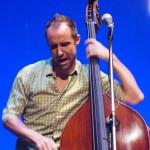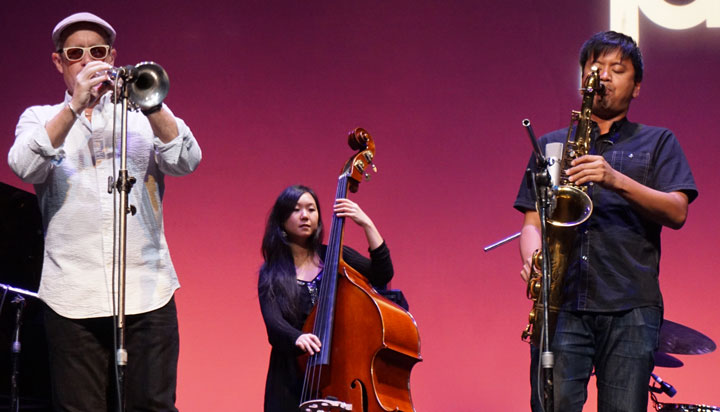The 26th annual Wangaratta Jazz and Blues Festival has changed.
Review of Wangaratta Jazz and Blues Festival by John McBeath. Courtesy of the Australian.

The popular covered main street stage, a free area, is gone replaced by a couple of new stages, one charging entry, and the program has now been broadened to include a number of non-jazz performers. This pleased some, but irritated jazz purists, who believe the festival should be true to its title, as there are sufficient alternatives for non-jazz artists, while jazz performers often struggle to get their music heard.
Friday night’s opener featured the foremost overseas headliner: multi-award winning US trumpeter Dave Douglas with the 15 piece Monash Art Ensemble playing Fabliaux (Fables) a suite of nine movements. The music is advanced orchestral jazz composition based on 14th century French musical styles. There were opposing duets including trumpet pitted against clarinet; trombone and vibraphone; or keyboard and viola; sometimes in rhythm, sometimes not, and electronic effects generated throughout.
Douglas appeared in other roles: fronting his quintet and as a duo with some great inventions by pianist Paul Grabowsky, where Douglas demonstrated his familiar trait, taking a phrase from a simple tune and cleverly reworking it. A highlight was his quintet cranking up excitement with its frontline of trumpet and Jon Irabagon’s powerfully inventive tenor sax, aided by Linda Oh’s imaginative bass, Matt Mitchell’s thoughtfully responsive piano, and powerhouse drummer Rudy Royston.
Overseas headliners were fewer than many previous years, and one attracting attention was Canadian flautist/saxophonist Jane Bunnett leading Maqueque, her all-female sextet of Cuban musicians. They delivered a high temperature program of Afro-Cuban rhythms featuring drumkit, cajon box drum, plus congas, piano, electric bass, and an array of percussive instruments. Four of the group sang in unison with the leader’s phrasing on soprano sax as the exotic Latin beat throbbed.
Australian bassist Linda Oh teamed up with two fellow members of the Douglas quintet, Irabagon and Royston to play numbers from her album Sun Pictures. She also added virtuoso Adelaide guitarist James Muller. Royston’s solo showed that when it comes to drumming volume, less can be more. Guitar/sax interaction reached feverish pitch, and the diminutive Oh played bass with artistry and surprising strength.
Pianist Matt Mitchell from the Douglas band gave an improvised solo performance in the unique acoustics of the Holy Trinity Cathedral; high treble notes streamed out as complex chords accented and assisted mood changes.
US bassist David Friesen was paired with Sydney pianist Mike Nock – a reunion after almost 40 years – to play Friesen’s and Nock’s compositions, mostly relaxed pieces.
In a sad but dynamic musical event commemorating the life and death of saxophonist/composer David Ades, Brisbane saxophonist Zac Hurren assembled a quartet of two tenors, himself and Julien Wilson. With bassist Cameron Undy and Danny Fischer on drums celebrating the release of Ades’s final album, the two horns paired and juxtaposed superbly, generating wide stanzas of high energy.
Lloyd Swanton’s monumental composition Ambon is a suite of 12 parts for a 12 piece ensemble, portraying by narration and music his uncle’s experiences as a Japanese POW on the island of Ambon. At well over two hours duration, some of the scripting and elongated musical movements could benefit from some editing. Nevertheless it’s a commendable and at times a highly moving work.
Afro-Peruvian jazz, a rarity in Australia, is far more than just a Latin-style beat. Studied in the US and Peru by Perth drummer Daniel Susnjar, his Australian septet showed that the genre includes impacting melodies and hugely forceful rhythms.
For 12 bar enthusiasts there were diverse blues protaganists including US groups Canned Heat and Old Gray Mule, Australians Joe Camillieri, Blues Brothers 3677, Ash Grunwald, Russell Morris and many more.
National Jazz Awards this year were for acoustic bass and the $12,000 prize plus ABC recording contract was won by Sam Anning. Second was Alex Boneham, and third place went to Tom Botting.















